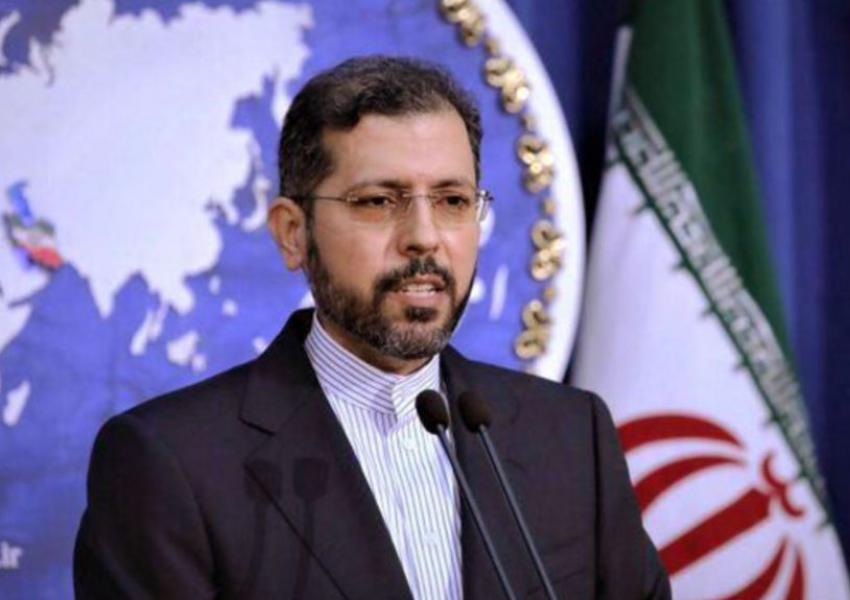
Spokesman Junks German ‘Nuclear Plus’ Idea As Iran Hardliners Push Escalation
Saeed Khatibzadeh, Iran’s Foreign Ministry Spokesman, said on Monday [December 7] that Iran would not renegotiate its 2015 nuclear deal with world powers, known as the Joint Comprehensive Plan of Action (JCPOA). He insisted the JCPOA was “already agreed upon.”
Khatibzadeh, speaking at his weekly press briefing, may have been reacting to Heiko Mass, Germany’s foreign minister, suggesting a “nuclear plus” agreement with Iran. In an interview with Der Spiegel published on December 4, Maas advocated a wider deal including Iran’s ballistic missiles and what he said was the Islamic Republic’s destabilizing role in the Middle East.
Maas was unclear as to whether he wanted reviving the JCPOA made conditional on these other issues, but his remarks suggest that a return to the JCPOA may not be as straightforward as Iran’s president Hassan Rouhani has suggested. “We need this [more comprehensive] agreement precisely because we distrust Iran,” Maas told Der Spiegel.
Since US President Donald Trump abandoned the JCPOA and imposed draconian sanctions on Iran, Tehran has expanded its nuclear program beyond JCPOA limits. Europe opposed these moves, and Maas told Spiegel not just that Trump’s ‘maximum pressure’ had failed but that the US easing sanctions was “the decisive factor” going forward.
While reiterating Rouhani’s support for an early return to the JCPOA, Khatibzadeh stressed Iran’s view that its missile program is a matter of sovereignty. “The JCPOA doesn’t require any new haggling," Khatibzadeh said. “Iran will neither compromise nor negotiate on [issues related to] its national security.”
The spokesman said that steps taken by Iran to expand its nuclear program since 2019 were easily reversible if other parties to the JCPOA again honored their commitments. Referring to a controversial bill passed by the Iranian parliament last week, Khatibzadeh said the Foreign Ministry would implement it if it “becomes law.” The legislation would require the authorities, if sanctions were not eased, within two months to halt the implementation of the Additional Protocol – which allows intrusive access to the United Nations nuclear inspectors – in two months and step up uranium enrichment.
Parliament, which has a majority of principlists of whom many oppose JCPOA, and the Guardian Council, a constitutional watchdog, have both ratified the bill in the face of the Rouhani administration’s opposition. The legislation requires steps taken two months from the time the law “becomes imperative to implement.” The wording has been interpreted by some as making the bill advisory, but its sponsors, including Parliament Speaker Mohammad Bagher Ghalibaf (Qalibaf) insist it would be mandatory on the administration.
A day after the bill received the speedy endorsement of the Guardian Council and was sent to the presidential office by Ghalibaf, Rouhani expressed disdain at what he called an “over-enthusiastic” attempt to sabotage his administration’s efforts to keep the JCPOA alive. In a quick counterattack, Ghalibaf told the president: “People have been waiting seven years for you to do something.”
The Rouhani government argues it was not consulted by the parliament before they passed the bill, and the president has neither endorsed the bill nor officially communicated it to the Atomic Energy Organization of Iran (AEOI), which runs the nuclear program. Rouhani and government spokesmen have expressed the view that nuclear matters are the prerogative of the Supreme National Security Council (SNSC) rather than parliament.
Khatibzadeh’s claim that the legislation has not yet become “law” suggests the administration may still challenge it, either through the Expediency Council, a body that adjudicates between state bodies, or by direct recourse to Supreme Leader Ali Khamenei, who has last word on important matters of state. The risk for anyone invoking the leader is that the last word might not be to their liking.






